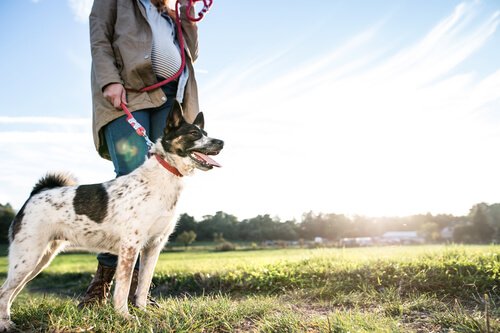Do dogs have emotional intelligence?
3 minutes

Last update: 30 June, 2018
There is a lot of talk regarding pets’ abilities. People are considering that they are having more human qualities as time goes by. They are known to understand a lot of what people tell them and have feelings. However, you might be wondering if dogs have emotional intelligence. Continue reading this article to get that answer!
What is emotional intelligence?
Human beings have many things in common with dogs, such as the cerebral structure known as the “limbic system.” This is a set of connections that manages responses to certain stimuli. It is related to memory, sexual instinct, personality and behavior. It interacts very quickly with the nervous and endocrine systems.
That might be why humans are so close to their pets: you can understand their emotions and feelings. Dogs have the ability to understand emotions just like humans do. That’s right: dogs can interpret what people feel and react accordingly.

Since dogs have emotional intelligence, people can bond with them in a different way. Canine brain activity increases when a dog is near his owner, when he returns home, and when he speaks or makes gestures.
Do dogs have emotional intelligence?
The ability to assimilate, perceive, understand and regulate one’s own emotions and those of others (i.e., artificial intelligence, according to author Daniel Goleman) is not something that only human beings have.
It seems as though dogs have the ability to recognize their own emotions (self-awareness), to control and redirect their moods (auto-regulation), to promote an action (motivation), to understand the emotions of those around them (empathy) and to build social relationships.
Dogs come from wolves. This is why they need to live in a herd. Within a herd there are well-marked roles, and relationships are established to ensure the well-being of the group. For dogs, their owners are part of the herd, and therefore they empathize with us, trying to understand our words and our orders. In addition, they try to understand what to do if something happens to us.
Just like wolves, canines can detect when a pack member is sad, angry, or tired. They even yawn when people do! This shows the strong emotional connection they have with humans. After several centuries of living together, people consider these pets as family members. In order to get along with others, dogs must have developed a new “sense”: emotional intelligence.
Of course, dogs aren’t the only ones that can do this. Human beings have also created the ability to understand a being from another species simply by looking at its face.
Emotional intelligence lessons from dogs
Don’t think you’re the only one who can teach things to your dog. He can also be an excellent teacher when it comes to emotional intelligence:
1. Being present
When he goes for a walk, the only thing that your pet thinks about is… taking a walk! He observes and smells everything, enjoys the stimuli and, if necessary, goes on the alert when there is danger.

2. Enjoying the small things in life
When you return after a stressful day of work, your dog treats you as if you were the Queen of England. He jumps, barks, wags his tail… what other family member greets you like that?
3. Empathizing
Maybe it’s because dogs know how to have a “blank mind” and focus on the important things. They can snuggle up with you when you’re sick, tired or sad. That’s their way of reminding you that you’re not alone…without saying a word.
4. Finding the best in people
People spend their lives talking bad about others, basing their judgements on prejudice, and pointing out other peoples’ flaws. That’s quite the opposite of what your pet does! He doesn’t care if you don’t wear makeup, if you’re disheveled or have cellulite.
Your pet loves you unconditionally, and you’re the most important thing in his life. Due to all of these things, it’s clear that dogs have emotional intelligence.
This text is provided for informational purposes only and does not replace consultation with a professional. If in doubt, consult your specialist.